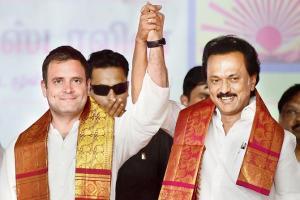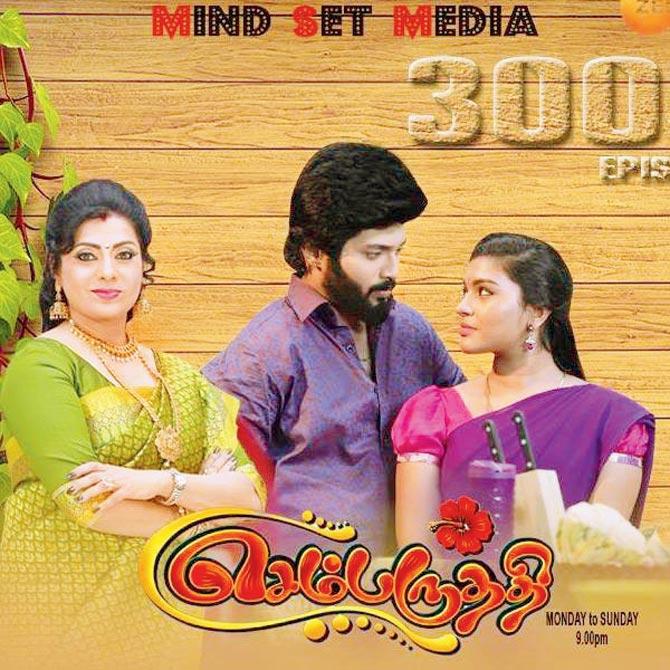Among heavy-duty and real issues like NEET, GST, jobs and farm distress, the cable price hike finds a strangely prominent place in Tamil Nadu politics

Rahul Gandhi with DMK President MK Stalin during an election campaign in Salem. Pic/PTI
Chennai: Rajendran owns and runs a small teashop on Egmore's Montieth Road. On his shop radio, DMK Chief M K Stalin is explaining the party's election pitch of the Secular Progressive Alliance (the name for the DMK-led combine in Tamil Nadu). Stalin speaks about ridding people of GST ills, assures youngsters that a Cong-led UPA govt would generate jobs and reiterates the Cong' promise of R6,000 a month minimum income to the poorest families.
ADVERTISEMENT
Smack in the middle of these heavy-duty issues that affect everyday life for the voter, Stalin promises the people of Tamil Nadu that if the SPA is voted to power, they would bring down cable TV rates to pre-TRAI rates of under '100 for all channels, which was the norm in the state till last year.
Cable — a hot-button issue
"I have disconnected the cable connection at home since the prices became more than '300," says Rajendran. "The family is very unhappy with me, but I just can't afford it." It is not just in his radio address that Stalin harps on cable prices. He does it in his road shows also. In Chennai earlier, the crowd absorbed all the other promises in rapt attention. But when he announced cable price cut for the benefit of thai-kulam (literally, 'the mother race', the Tamil euphemism for women), the crowd broke into jubilant raptures. A majority of those in attendance were men.

Poster of the popular Tamil serial Sembaruthi. Pic/Facebook
And it is not just Stalin. Farther south in Sivaganga, Congress candidate Karti Chidambaram of INX CBI case infamy, is taking it up one step further. He too invokes the cable tariff hike, but compares himself to the lead of a popular soap — Sembaruthi — named Karthik. "The next time you watch Vanaja and Parvathi (lead characters) fight, think of me and vote for me," he says, according to reports about his campaign. While the cable tariff hike has affected people across class and region, it was always bound to become a hot-button issue in a state like Tamil Nadu. First came the free TVs, which were promised and delivered by Stalin's father, the late Muthuvel Karunanidhi in 2006.
Also Read: Elections 2019: Tamil Nadu should not be ruled from Nagpur, says Rahul Gandhi
A state monopoly
The late Jayalalithaa Jayaram, who defeated the DMK in 2011, must have understood the impact and reach that the free television sets were providing political parties. She revived the dormant Arasu Cable, a state-subsidised PSU to provide television content to the public. Arasu cable bought paid channels and offered them at subsidised rates to people, which allowed it to give 150-200 channels at a cost of '70-'100 a month. Arasu Cable's subscriber base, which was around 400,000 when it was discontinued in 2007, spiked to 62 lakh. Today, that figure stands at one crore. In a state with a population of close to seven crore, that is almost every household covered.
"You cannot separate elections and popular television entertainment in Tamil Nadu," says Dr. G Dhananjayan, film producer and founder of Blue Ocean Film and Television Academy. "Nowhere else in India will you see this. Hence it is not really surprising that cable prices have become an election issue." Dhananjayan says the free televisions of 2006 and the state's monopoly of distribution allowed the two Dravidian parties to freely communicate with the voter. It allowed politicians to be in people's houses every day of the week. The two parties were also prioritising and gaming what was shown when in power. Channels controlled by the ruling party would get priority in the order. "It goes back to 1995, when Sun TV was launched by Karunanidhi's grandnephews Kalanidhi Maran and his brother Dayanidhi," says Dhananjayan.
Also Read: Elections 2019: Naredra Modi to address two rallies in Tamil Nadu on April 13
Disadvantage ADMK
Sun TV was a step up from Sumangali, which produced content and sold or rented them in video-cassettes. When India got cable, Sumangali's content was turned into satellite TV channel. The initial serials were helmed by top film directors and starred leading actors. "Sun TV still owns 50 per cent share of the market even though the Tamil scene is thriving," adds Dhananjayan. "If Sun or any other channel aired a newly released Tamil film, the TRP would be over 80. To put that in context, the highest TRP for anything else including live sport, will not be more than 8. Alongside such premium entertainment content, the parties started building on their own news channels. Hence the importance of cable TV this election."
Despite having run Arasu cable all along, the ADMK finds itself in no position to milk the benefits of the subsidy or even counter the DMK-Congress claims by promising to reduce the prices during campaigning this year. This is because the current leadership, which was put in place after Jayalaithaa's death, is seen as a lameduck administration that doesn't have it in itself to take on the Centre in any issue — be it the common medical entrance exam or the cable tariff. With the challengers placing the blame at BJP's doorstep, it could have a huge impact in the outcome in a state that is just one of probably two in which Prime Minister Nadrendra Modi finds no currency, when people —especially the women — go out to vote three days from now.
Rs 70-100
Cost per month that Arasu cable gave 150-200 channels
50%
Current share of Sun TV in the market
Catch up on all the latest Crime, National, International and Hatke news here. Also download the new mid-day Android and iOS apps to get latest updates
 Subscribe today by clicking the link and stay updated with the latest news!" Click here!
Subscribe today by clicking the link and stay updated with the latest news!" Click here!






